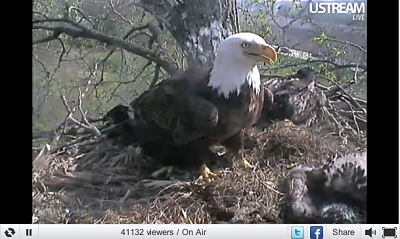
Millions of people have watched bald eagle chicks hatching and feeding in real time in Decorah, Iowa, thanks to a nest cam. As senior editor Julie Leibach wrote in April, “Even when snacking on bloody carrion, the young raptors are adorable.” With attentive parents and plenty of grub, the little fluff balls have grown immensely in the last month.
All of the attention on this particular couple got me wondering about the particulars of eagle pairs—if they’re monogamous, how they split parental duties, and the likes. Turns out, Carolyn Shea answered this very question already for Audubon:
| Bald eagles stay hitched until death do they part, often returning year after year to the same nest. While there, the pair continuously adds to the structure, so that after many seasons it assumes gargantuan proportions and stands as a symbol of their fidelity. In Vermilion, Ohio, one behemoth, used for more than three decades, measured 9 feet across and nearly 12 feet high, and was estimated to weigh more than 2 tons. Though the birds' courtship rituals are spectacular in their display of aerial acrobatics, it is nest building that cements the bond between male and female. Dad's contribution to his progeny doesn't end at conception: He sticks around to help incubate the eggs and feed the offspring. Bald eagles, which are capable of breeding at about 4 years and have been known to live to 28 in the wild, are not unique in their sexual liaisons. According to Frank Gill, Audubon's senior vice president of science, more than 95 percent of bird species are monogamous, making them among the most loyal members of the animal kingdom. Recent research, however, is yielding evidence that philandering may be more prevalent than previously supposed. "The general rule emerging," says Gill, "is that sexual infidelity is common in socially monogamous species." |
If you’re burning for more info on the endlessly fascinating subject of avian sex and fidelity, check out assistant editor Michele Wilson’s roundup of birds that mate for life. For a more in-depth look at mating behavior, try “The Mating Game,” Wayne Mones’s review of Bernd Heinrich’s latest book, The Nesting Season.
“Monogamy, like all mating strategies, incorporates a rich palate of behaviors and rarely results in complete lifetime sexual fidelity to a single mate,” Mones writes. “It’s advantageous only when nesting and parenting responsibilities demand an extraordinary investment of energy by both parents. In fact many birds that we ‘know’ to be monogamous are like other animals (including humans) in that they frequently engage in extra-pair copulations as conditions allow.”
In other words, they two-time when times are good.

